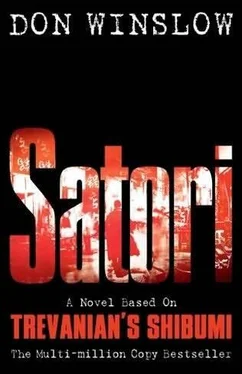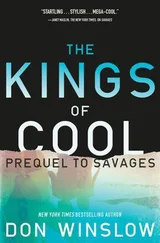
The phone rang in Haverford’s room at the Peninsula Hotel in Hong Kong.
“Monsieur Cartier?” the voice asked, speaking French with a heavy Vietnamese accent.
“Yes?”
“A large transfer of funds request has just come through our Vientiane branch,” the speaker said, “and triggered an internal notice that you were to be notified.”
“Yes?”
“From a Monsieur Guibert?”
“Routed to what destination, please?”
The speaker rattled off an account number in Lausanne.
“That’s fine, yes.”
“Thank you. Good morning.”
“Good morning.”
Twenty long minutes later, the manager returned with the happy news that everything seemed to be in order, and escorted Nicholai to a different room where a wire operator sat behind a broad wooden table. The manager handed the operator the papers and told him to effect the transfer.
“The funds will be available at opening of business in Switzerland,” the manager said, nonverbally according Nicholai more respect. It had been a very large sum indeed.
“Thank you,” Nicholai said.
“Thank you for banking with us,” the manager replied. Then, needing to let Nicholai know that he was a busy man, he added, “If there is nothing else?”
“That will be all, thank you.”
Nicholai met the insulted Chen back in the lobby.
“Finished?” Chen asked brusquely.
“The man is an officious fool,” Nicholai said.
“It doesn’t matter.”
“I would like to see some of the sights now,” Nicholai said, “if you would be kind enough to escort me.”
“With pleasure.”
They got back in the car and headed for the Great Wall.
THE PLAN, HAVERFORD THOUGHT as he stood at the Star Ferry landing in Kowloon, is coming together.
Hel had received the message sent through the Muslim restaurant. He knew where to go and how to get there. The members of the extraction team, composed of Hui, were making their way to the Temple of the Green Truth.
“We’ll need some talent,” Haverford warned. “Things could get tough.”
Benton answered, “The whole team is trained in a Muslim Chinese martial art – bajiquan. Very good for close-range work in confined spaces. Same art used by Mao’s personal bodyguard. The team leader is a master.”
“He’ll need to be,” Haverford said.
“Don’t worry,” Benton answered. “He’s quick and clean.”
Quick, maybe, Haverford thought, but nothing about what we do is ever clean.
It would be good to get out of Hong Kong. Haverford never really liked the city, and the British were ridiculously sensitive about the “cousins” poaching on their turf. Just this morning, his British counterpart, Wooten, had accosted him at the breakfast table at the Peninsula before Haverford could even get down a cup of the less than mediocre coffee.
“Good morning, Adrian,” Haverford said. “A little early for you, isn’t it?”
“A Bloody Mary’s on the way over,” Wooten answered. A large, bluff man with, if Haverford recalled correctly, a rugby background, Wooten looked out of place in China. Looks were deceptive – Wooten was a noted Sinologist, a first at Cambridge and a lifetime in Asia attesting to the fact. “What brings you onto my patch, Ellis?”
“It isn’t the coffee, I’ll tell you that.”
“Then what is it?”
“Awfully direct, Adrian.”
“It’s early and I’m hungover.” The waiter arrived with the Bloody Mary. Wooten took a grateful sip.
“Just passing through,” Haverford said, “on my way back from Macau, checking in with some of the tea-leaf readers there.”
“Anything my king should know about?”
“Not unless he’s awfully bored,” Haverford said. “It’s the usual unusual – the Chairman is winnowing his enemies, what opposition he has are keeping their heads low, anti-this and anti-that campaigns are going on.”
“My boys reported a Benton sighting yesterday.”
“Everybody gotta be someplace,” Haverford answered, echoing the old Myron Cohen joke. He’d have to catch him the next time he was back in New York. But damn Benton and his leadfootedness.
Wooten nodded. “But a Benton sighting and a Haverford sighting. Raises the hackles, you must admit.”
Haverford shrugged.
Wooten’s red face turned unusually serious as he said, “I don’t want you mucking around on my pitch, Ellis. You, or Benton, or the both of you. Do I make myself clear?”
“I’m just back to Tokyo, Adrian.”
“Didn’t mean to be inhospitable,” Wooten said. “How are you getting to the airport?”
“Taxi.”
“No need,” Wooten said. “I’ll get one of my boys to drive you. Otherwise they just sit around all day quaffing beer.”
So I’m being escorted out of the colony, Haverford thought.
All right by me, the planning here is about done anyway.
WU ZHONG SMASHED his elbow into the wooden post.
A bolt of pain shot up from his forearm, through his wrist, and into his hand, still open in the distinctive “rake” posture that gave bajiquan its name, but Wu exhaled it away and looked back at the splintered wood. His elbow had put a hole three inches deep into the post.
That was bajiquan – it relied on quick, single, devastating strikes. Its great master Li Wu Shen once said, “I do not know what it feels like to hit a man twice.” Had this post been a man, the explosive force of the blow would have shattered his throat or his forehead, or simply stopped his heart. Wu would have continued practicing, but heard the call for prayer from the minaret just a block away.
He slipped into a white kaftan, put on his cap, and stepped out of the dojo onto Nelson Street. The mosque was the largest in Hong Kong, servicing the island’s small but devout Muslim community. The ulama had grown in recent years, as refugees fled from the mainland and found a more congenial home in cosmopolitan Hong Kong than in Chiang Kai-shek’s Taiwan.
As he walked toward the mosque, Wu was glad to be going to prayer. Tonight he would be infiltrated through the New Territories across the border into his homeland. The assignment itself should be nothing, the danger lay in getting in and getting out. A wushu instructor with the KMT Army for years before he retired to civilian life, he would find rough handling if he fell into Communist hands.
Now thirty-five years old, Wu had a wife and three young children who needed him. Still, he could not refuse an assignment like this. It paid well; moreover, it allowed him to strike a blow against the hated Communists, godless Kaffirs who oppressed his people. Not only would he bring home a year’s worth of income, but the American agent promised to provide a shipment of rifles to the nascent rebel movement in Xinjiang.
A tall man with impressively broad shoulders, he had to turn sideways to get through the old doorway of the mosque. He shucked off his slippers, found the prayer mat in its accustomed place, walked into the sanctuary, and knelt. Several other men, all friends from the neighborhood, were already there and had begun prostrating themselves.
Stretching his forehead to the floor, Wu could not get the assignment out of his mind. Killing was as nothing. He had used his mastery of bajiquan to kill many times before – Communists in Shanghai, Japanese in Hunan, and then the Reds again until Chiang gave up the fight and left so many of them to flee for their lives.
Now he was in a new war – a jihad to save his people. If killing helped to achieve that, then so be it. He would do it and if it was God’s will that he survive and come home to his family, then inshallah. If not, at least he knew that the ulama would not let his family starve. A brother would marry his widow and take care of his children.
Читать дальше













